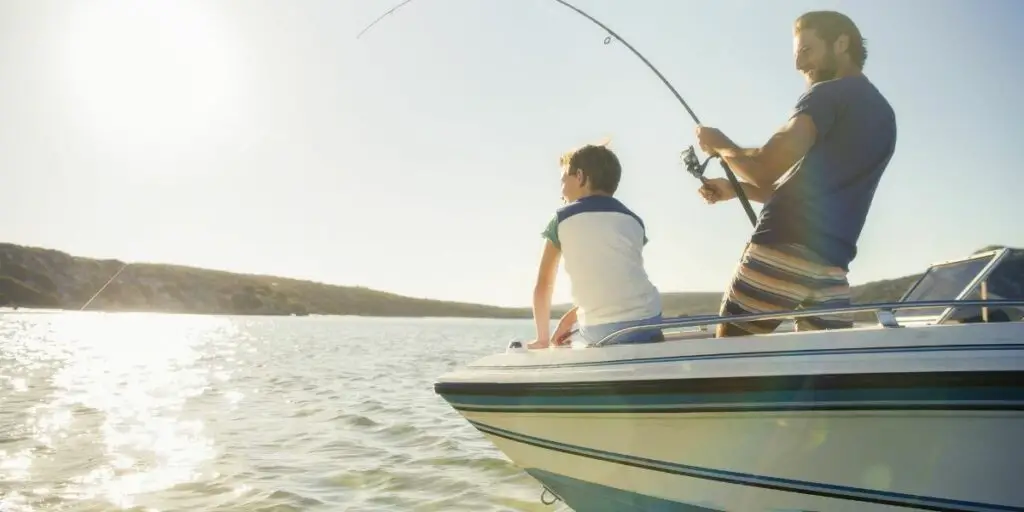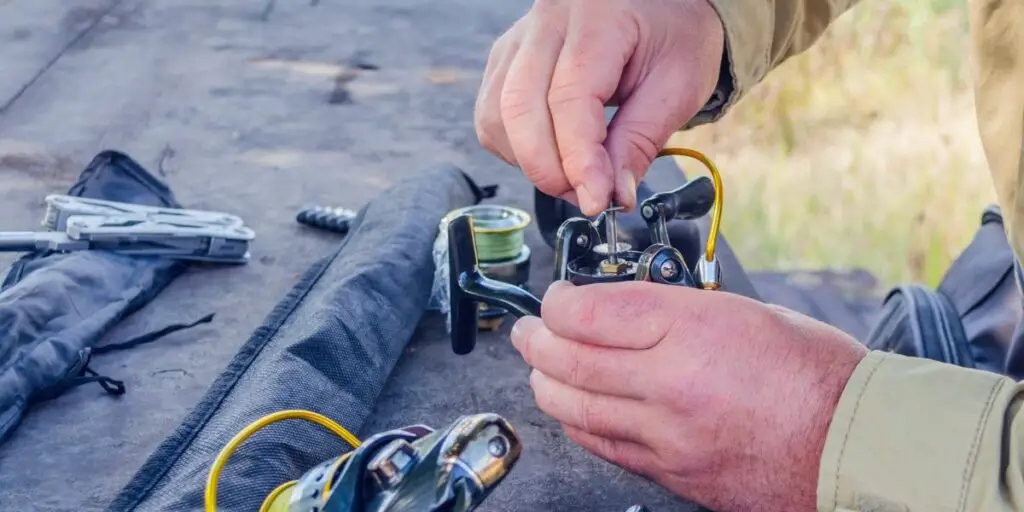
You can use a freshwater pole in saltwater provided it meets certain criteria. Saltwater contains corrosives that freshwater poles may not be able to withstand without special care.
You have to realize that lakes and oceans are different in composition, size, and even the type of fish therein.
Therefore, it is important to note that the standard fishing pole for lakes will not do an excellent job in the ocean.
For one, it will get destroyed by all the chemicals as they will eat into the pole. Secondly, the pole’s weight may not provide the support needed to catch the bigger fish found in the ocean.
Essentially, some lake fishing poles will work better than others in the ocean. It all depends on the fishing technique you plan to use and the type of fish you plan to catch.
Then, you can choose one with a suitable length and weight.
Table of Contents
- 1 What Should You Consider When Choosing A Lake-Fishing Pole To Use In The Ocean?
- 2
- 3 What Are The Differences Between Lake Fishing Poles And Ocean Fishing Poles?
- 4 What Type Of Fishing Pole Can I Use For Both The Lake And The Ocean?
- 5 How Do You Protect A Lake Fishing Pole When You Use It In The Ocean?
- 6
- 7 Bottom Line
What Should You Consider When Choosing A Lake-Fishing Pole To Use In The Ocean?
Before you choose a freshwater pole to use in the ocean, it is crucial that you understand the technical differences between lakes and oceans.
The most obvious one is that most lakes have fresh water while oceans have salty water.
Therefore, while you can use an ocean fishing pole in a lake, you cannot use any lake fishing pole in the ocean.
At the very least, the pole you choose has to be able to withstand the corrosive properties of the saltwater.
Additionally, oceans have a larger body mass compared to lakes. As a result, there is a wider range of fish in oceans than in lakes.
Furthermore, saltwater fish are relatively bigger and heavier. This means that the pole you choose has to be thick and long enough to support the size and weight of the fish.
Also, you must know the fishing rod types for both freshwater and saltwater. There is a wider variety of fishing rod types for freshwater: spinning, telescopic, ultra-light, baitcasting, closed pin-casting, and carbon-fiber.
Saltwater fishing rod types include spinning, bait-casting, trolling and jigging. The common types, therefore, are bait-casting and spinning rods. This piece of information is vital when choosing the perfect pole.
Lastly, it is vital that you consider the fishing technique that you plan on using. Are you planning to toll offshore or cast crankbaits away from the shore?
Once you know the technique, you will use, factor in the size and strength of the fish you are targeting. Then choose a fishing pole with a befitting fishing power.
What Are The Differences Between Lake Fishing Poles And Ocean Fishing Poles?
There are several differences between lake fishing poles and those used in the ocean. Both types of poles are built to suit the environment they are used in.
The corrosive nature of saltwater requires that fishing poles be made with material that will not be ‘eaten away’ easily.
That is why most saltwater fishing rods are constructed with either graphite or fiberglass. Their outer covering is also anodized to prevent the corrosives from damaging the pole.
On the other hand, any material is suitable for freshwater fishing as there is no risk of corrosion whatsoever.
Ocean fishing poles are thicker and more substantial than freshwater fishing poles. This is because oceans have bigger fish compared to lakes. Therefore, saltwater fishing poles need the strength to handle heavier weight.
Another way lake fishing poles differ from ocean fishing poles is the line capacity of the poles. The line capacity of the pole should match with the line weight that is recommended on the rod.
Ocean fishing rods have a larger line capacity because they catch heavier and bigger fish than freshwater poles.
Ideally, you should use saltwater fishing poles for fishing in the ocean because freshwater poles are likely to corrode, rust, and get damaged by the harsh ocean water.
However, with proper maintenance and careful consideration, a lake fishing pole can get the job done just right.
What Type Of Fishing Pole Can I Use For Both The Lake And The Ocean?
The direct answer for this would be a saltwater fishing pole because it can withstand both environments. However, if we look at the question from an ocean-fishing-pole perspective, the answer would be a little more complex.
The fishing pole would have to imitate the characteristics of a saltwater fishing pole as much as possible.
That means that it would have to be adequately thick, have the perfect line capacity, and be made of material that does not react with salty water easily.
Also, you would have to factor in the fishing technique you are planning to use and the fish you are planning to catch. To use a lake fishing pole in the ocean successfully, you should know how to protect your equipment.
How Do You Protect A Lake Fishing Pole When You Use It In The Ocean?
Like we have already established, lake fishing poles do not hold up very well in the ocean environment. However, there are things you can do to improve their performance and longevity.

They include the following:
- Coat and lubricate it often– Lubricating your fishing rod with oil and grease protects it from coming into direct contact with corrosives. And even if it does, the effects will be downsized a whole lot. Lubricants also maintain the fishing pole’s parts and bearings.
- Rinse it as soon as you finish fishing– You should always rinse your fishing pole with freshwater immediately you are done using it in the ocean. This is to get rid of the saltiness and corrosives that may be on the surface.
- Clean it from time to time – oceans are very sandy, so it is very likely that your fishing pole will have some sticking in its parts. Cleaning it gets rid of these particles.
- Avoid straining it– When using a lake fishing pole in the ocean, make sure you consider the size of the fish. Only catch fish that the pole can withstand.
Remember that fishing poles are not made to last forever. So don’t beat yourself up if it starts failing. Even saltwater poles succumb to corrosion and age sooner or later.
Bottom Line
You can use a lake fishing pole in the ocean provided you maintain it accordingly. Oceans have salty water, which is corrosive to many materials.
This is a detail that you should consider before using your freshwater pole in the ocean.
It is also essential to factor in the fact that fish in the ocean are larger and heavier than those found in lakes.
Proper maintenance practices are important if you want your fishing pole to last for a long time.